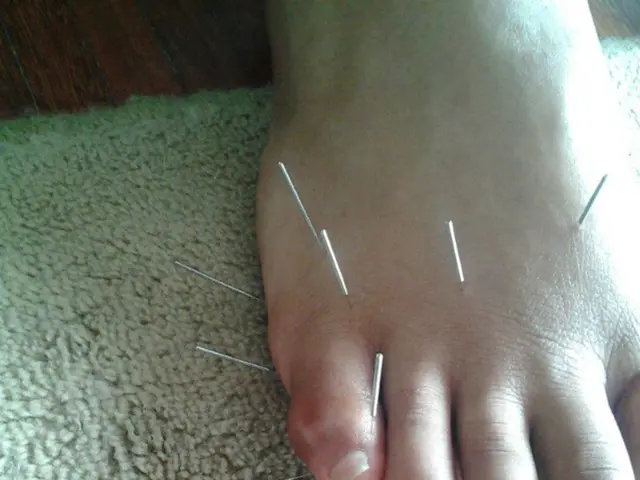The surprising association between vitamin D and contraception has been discovered
Fiddling with Vitamin D Levels: The Effect of Estrogen-Based Contraceptives
Say you're on birth control pills, guests! Those little pink or blue tablets might be doing more than preventing unwanted pregnancies. Researchers have discovered that women using estrogen-based contraceptives have a higher quantity of circulating vitamin D, while women who stop using these contraceptives may experience a substantial drop in vitamin D levels.
Vitamin D, that sunshine-induced superhero, plays a crucial role in maintaining the correct levels of calcium and phosphorus in your blood. It's also vital for absorbing calcium, a key component of strong bones. Sources of vitamin D include fish and eggs, but approximately 90% of this essential nutrient is produced by your body through a chemical reaction after sun exposure.
Vitamin D deficiency can lead to nasty conditions like rickets and osteomalacia (softening of the bones). Given vitamin D's importance in bone formation, it's particularly significant during pregnancy.
Dr. Quaker E. Harmon, from the National Institutes of Health's National Institute of Environmental Health Sciences, decided to delve deeper into the connection between vitamin D and oral contraceptives.
Vitamin D and Contraception
The team conducted a cross-sectional analysis of data from the Study of Environment, Lifestyle, and Fibroids (SELF), an investigation into reproductive health. They surveyed 1,662 African-American women aged 23-34 living around Detroit, MI, asking about their contraceptive use, sun exposure, and any vitamin D supplements they took. In return, the ladies provided blood samples for vitamin D level analysis.
During pregnancy, women produce increased levels of the active form of vitamin D to support the development of the fetal skeleton. This higher demand increases their risk of vitamin D deficiency and bone-related problems.
"Our study found that women using contraception containing estrogen tended to have higher vitamin D levels than other women," said Dr. Harmon. Even after considering factors such as seasonal exposure to light, the effect remained significant.
"We couldn't find any behavioral differences that could explain the increase," added Dr. Harmon. "Our findings suggest that contraceptives containing estrogen tend to boost vitamin D levels, and those levels fall when women stop using contraception."
After adjusting for confounding variables, the use of contraceptive pills, patches, or rings containing estrogen was associated with a 20% increase in 25-hydroxy vitamin D levels. Current users of birth control had higher levels of vitamin D, while past users had average levels.
Vitamin D Deficiency in Early Pregnancy
These findings, published in the Journal of Clinical Endocrinology & Metabolism, raise a concern for women who are planning to become pregnant. As they start trying to conceive, they run the risk of becoming deficient in vitamin D. Dr. Harmon advises, "For women who are planning to stop using birth control, it's worth taking steps to ensure that vitamin D levels are adequate while trying to conceive and during pregnancy."
Medical News Today asked Dr. Harmon why estrogen-based contraception might influence vitamin D levels. She explained, "We don't know why vitamin D levels are higher. Other work suggests that the levels of other vitamin D metabolites are changed when women use estrogen-containing contraception, indicating that there may be alterations in the metabolism of vitamin D. Further research is needed."
The current study focused solely on African-American women; Medical News Today asked Dr. Harmon if race might play a role in this effect. She responded, "The same association has been observed in younger and older women who are not African-American, so we believe this association is not related to race. In the United States, African-American women are more likely to be vitamin D-deficient, so small increases or decreases in their vitamin D concentrations may be more important."
Dr. Harmon is continuing to follow this group of women to further investigate the relationship. She's also working on another group of participants to study how vitamin D varies across the menstrual cycle.
While this research uncovers some intriguing insights, it's essential to remember that more work is needed to fully understand the relationship between estrogen-based contraceptives and vitamin D levels. In the meantime, ensuring adequate vitamin D intake and sun exposure remains vital, regardless of contraceptive use.
- "For women planning to become pregnant, it's advisable to consider maintaining adequate vitamin D levels, as the study suggests that stopping estrogen-based contraception might lead to decreased vitamin D levels."
- "In the study, women using contraceptives containing estrogen were found to have higher levels of 25-hydroxy vitamin D, which may indicate a boost in vitamin D levels due to contraceptive use."
- "The connection between estrogen-based contraceptives and vitamin D levels is significant, as deficiencies in vitamins can lead to conditions like rickets and osteomalacia, particularly during pregnancy."
- "During pregnancy, the higher demand for vitamin D increases the risk of deficiency, highlighting the importance of maintaining adequate levels through nutrition, sun exposure, or supplements like women's vitamins."
- "It's important to note that this study focused on African-American women, but the same association has been observed in women of different races, suggesting that the connection between estrogen-based contraceptives and vitamin D levels may not be race-specific."
- "Maintaining a balanced and nutrient-rich diet, including foods that are sources of vitamins like fish, eggs, and women's multivitamins, is crucial for overall health, especially for supporting women's health and health-and-wellness."







